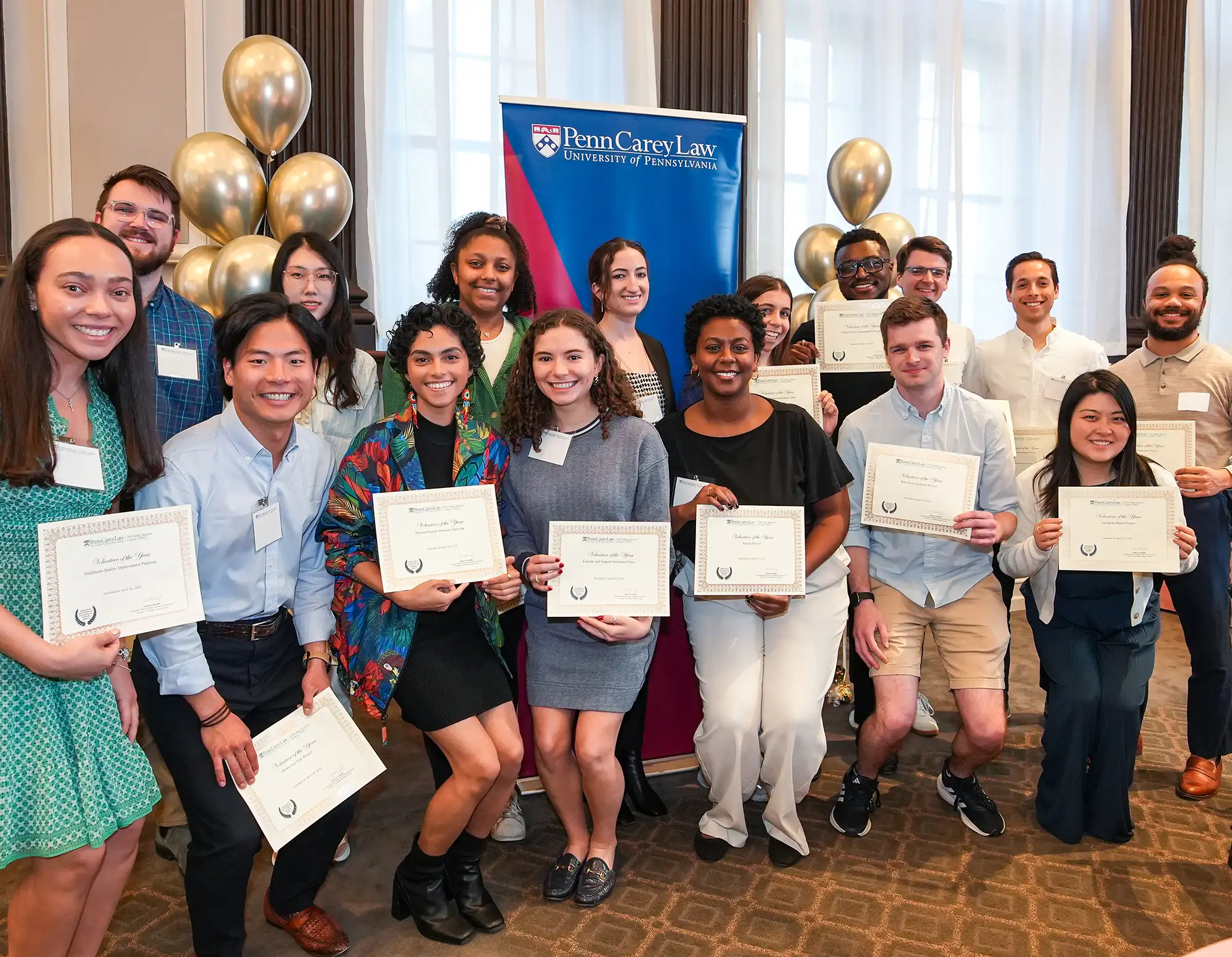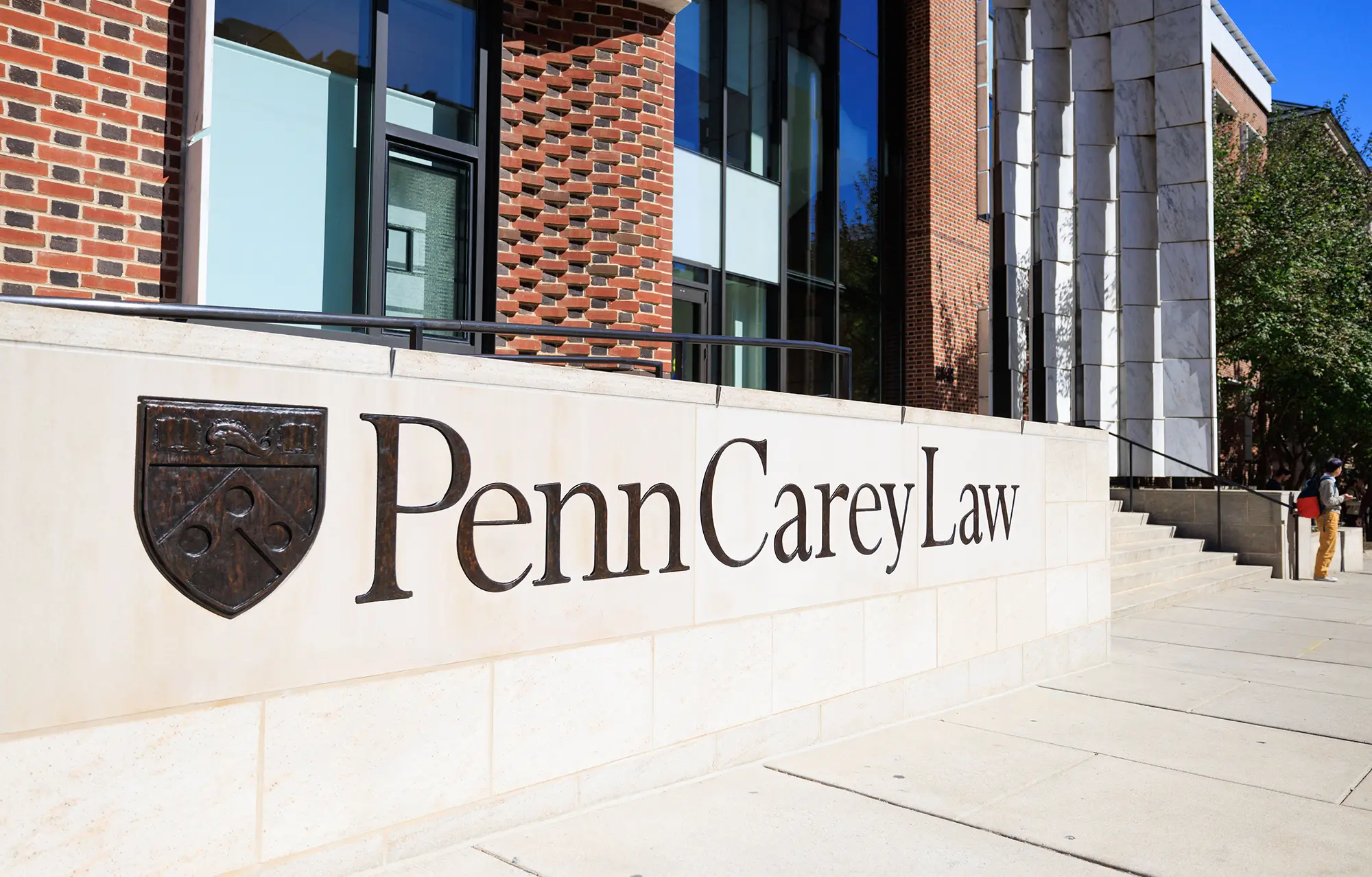

JD Program
2025-2026
Table of Contents
Your Future Begins Here

A national leader in interdisciplinary legal education, Penn Carey Law’s rigorous curriculum and experiential learning model prepares students to launch impactful careers in a wide variety of legal specialties and sectors. Our collegial and vibrant community encourages students to take intellectual risks, explore innovative approaches, and collaborate to achieve unparalleled impact.
Learning Across Disciplines

A Cross-Disciplinary Education
Penn Carey Law’s cross-disciplinary academic programs are fully integrated with the University of Pennsylvania’s world-class institutions, including the Wharton School, Perelman School of Medicine, Fels Institute of Government, and six other partner schools. This collaboration provides our students with unparalleled opportunities to prepare for successful careers and engage with every major issue facing our society.
Class of 2025
%
joint degree
a joint
degree
%
one non-law
class


Experiential Learning
The Gittis Legal Clinics, the Law School’s teaching law firm, puts students on the front lines of representing clients with complex legal concerns under the close supervision of dedicated, seasoned attorneys. Students can also choose from numerous field placements and externships at governmental agencies and nonprofit organizations to train in a wide variety of legal work outside the Law School.
The Legal Practice Skills program involves year-long simulation courses that teach fundamental lawyering skills through case studies, hypothetical exercises, and real-world lawyering assignments.
Gittis Legal Clinics
Civil Practice Clinic
Criminal Defense Clinic
Detkin Intellectual Property & Technology Legal Clinic
Entrepreneurship Legal Clinic
Interdisciplinary Child Advocacy Clinic
Justice Lab
Legislative Clinic
Transnational Legal Clinic
Real-World Career Success

Employment Statistics
%
are either employed or enrolled in
received judicial clerkships in the last five years

19.4%
13.5%
8.2%
3.0%
2.3%
1.6%
1.6%
1.6%
9.5%
PA
DC
CA
IL
TX
FL
MA
UK
Other*

CO, DE, GA, NJ, MN, NV, OR, WA, WV, AZ, KS, LA, NC, OH, SC, VA

An Ethos of Service

The Toll Public Interest Center (TPIC) plays a pivotal role in nurturing this ethos. It houses the Law School’s pro bono program and oversees robust programming to support students’ development as practice-ready, civically engaged leaders who embrace service. All JD students complete a 70-hour pro bono commitment – the largest in the country – and engage in real-world legal work through more than 20 pro bono projects spanning 6 practice areas.
Beyond the classroom and pro bono work, TPIC also partners with students and alumni eager to apply their legal expertise towards positive societal impact. Through flagship initiatives like the Toll Public Interest Scholars, the Toll Public Interest Fellows, and the TolLRAP loan repayment assistance program, TPIC helps graduates realize their public interest goals.
In addition, specialized programs such as the Leo Model Foundation Government Service & Public Affairs Initiative prepare students for leadership roles in government and policymaking, while the Cozen Family Voting Rights Fellowship supports graduates working to advance and protect voting rights.

Pioneering Scholarship

Faculty regularly engage with policymakers on issues ranging from regulation to international law and expand students’ knowledge and experience through innovative courses and collaborative, interdisciplinary research.
With eleven dedicated centers and institutes, Penn Carey Law advances cutting-edge legal scholarship and positions the School at the forefront of thought leadership on today’s most pressing legal and policy challenges.
Academic Centers & Institutes
Center for Asian Law
Center for Ethics and the Rule of Law
Center for Tax Law & Policy
Center for Technology, Innovation & Competition
Criminal Law Research Group
Institute for Law & Economics
Institute for Law & Philosophy
Legal History Consortium
Penn Program on Documentaries & the Law
Penn Program on Regulation
Quattrone Center for the Fair Administration of Justice
A Global Legal Education

All Penn Carey Law students enjoy abundant opportunities to explore academic and professional interests on a global scale.
Through partnerships with world-renowned institutions such as the London School of Economics, Sciences Po, Hong Kong University, and Waseda University, our students gain a deeper understanding of foreign law and engage in transformative cross-cultural experiences.
Signature programs such as our Global Research Seminars provide immersive international learning experiences addressing cutting-edge legal topics. Additionally, our robust selection of over 45 courses in international, foreign, and comparative law empowers students to pursue a comprehensive global legal education without leaving Philadelphia.
Our students collaborate with distinguished international scholars and global leaders, engage in internationally focused research projects and fact-finding missions, and participate in conferences, consortia, and symposia worldwide. Penn Carey Law prepares graduates to challenge assumptions, build a global network, and engage with today’s most pressing international issues.

Penn Carey Law students in Tokyo during their Spring Break 2025 trip to Japan, where they presented Pennsylvania COVID-19 policies to Tokyo Metropolitan Government officials. The visit also included a conference in Kyoto focused on global pandemic responses—the primary purpose of the program.
A Collegial Culture

Alumni remain deeply engaged with the Law School, regularly supporting student initiatives such as annual symposia and mentoring efforts.
While law school is intellectually demanding, life at Penn Carey Law is also supportive, encouraging, and dynamic. It is a place where students are empowered to grow both personally and professionally.
With small class sizes, students benefit from close engagement with faculty, staff, and classmates who value one another’s contributions and celebrate shared success.

Our Welcoming Community


Thrive in Philadelphia

Boasting a 9,200-acre park system, Philadelphia is home to idyllic settings such as Penn’s Morris Arboretum and Fairmount Park. Sports fans, artists, and music enthusiasts flock to the city, where the next world-class performance, gallery, or championship game is a short walk or subway ride away.
The city’s historical neighborhoods and diverse communities blend small-town warmth with the energy of an urban center on the East Coast. A city where people enjoy sharing their traditions with newcomers, Philadelphia is a place you can make your own.
Financing Your Education

We provide generous assistance to qualified students through a variety of grants, scholarships, and loans. Penn Carey Law also offers targeted support for students who demonstrate a commitment to public interest, as well as a loan repayment assistance program for graduates entering public interest careers. In addition, we are a proud participant in the Yellow Ribbon program which provides generous funding for our qualifying veterans. Students may also be eligible for federal and private student loans.

Learning Outcomes

Demonstrate a core knowledge and understanding of substantive and procedural law in a number of different subject areas;
Engage in legal analysis and reasoning, conduct efficient and effective legal research, apply problem-solving skills, and present findings, analyses, and recommendations efficiently and effectively in both written and oral communication;
Work collaboratively;
Demonstrate an understanding of the interdisciplinary nature of law and the contributions and benefits to legal analysis and problem-solving that other disciplines can make;
Exercise proper professional judgment and fulfill ethical responsibilities to clients, the profession, and society in general; and
Utilize a range of professional skills that facilitate active, competent, and ethical participation in the legal profession.

University of Pennsylvania Carey Law School
Philadelphia, PA 19104-6204
Office of JD Admissions & Financial Aid
Financial Aid:
Fax:
JD Admissions Office Email:
Financial Aid Email:
The University of Pennsylvania seeks talented students, faculty and staff with a wide variety of backgrounds, experiences and perspectives. The University of Pennsylvania does not discriminate on the basis of race, color, sex, sexual orientation, religion, creed, national or ethnic origin, citizenship status, age, disability, veteran status or any other legally protected class status in the administration of its admissions, financial aid, educational or athletic programs, or other University-administered programs or in its employment practices. Questions or complaints regarding this policy should be directed to the Executive Director of the Office of Equal Opportunity Programs, Franklin Building, 3451 Walnut Street, Suite 421, Philadelphia, PA 19104-6106; or (215) 898-6993.
